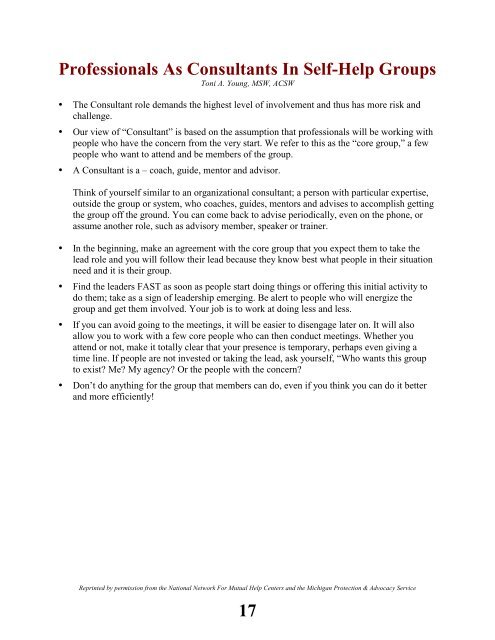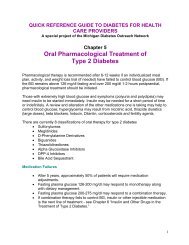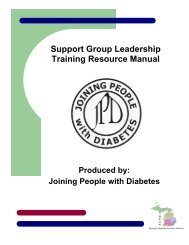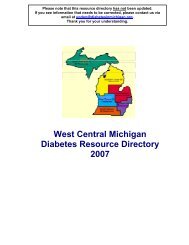Support Group - Michigan Diabetes Outreach Network
Support Group - Michigan Diabetes Outreach Network
Support Group - Michigan Diabetes Outreach Network
You also want an ePaper? Increase the reach of your titles
YUMPU automatically turns print PDFs into web optimized ePapers that Google loves.
Professionals As Consultants In Self-Help <strong>Group</strong>s<br />
Toni A. Young, MSW, ACSW<br />
y The Consultant role demands the highest level of involvement and thus has more risk and<br />
challenge.<br />
y Our view of “Consultant” is based on the assumption that professionals will be working with<br />
people who have the concern from the very start. We refer to this as the “core group,” a few<br />
people who want to attend and be members of the group.<br />
y A Consultant is a – coach, guide, mentor and advisor.<br />
Think of yourself similar to an organizational consultant; a person with particular expertise,<br />
outside the group or system, who coaches, guides, mentors and advises to accomplish getting<br />
the group off the ground. You can come back to advise periodically, even on the phone, or<br />
assume another role, such as advisory member, speaker or trainer.<br />
y In the beginning, make an agreement with the core group that you expect them to take the<br />
lead role and you will follow their lead because they know best what people in their situation<br />
need and it is their group.<br />
y Find the leaders FAST as soon as people start doing things or offering this initial activity to<br />
do them; take as a sign of leadership emerging. Be alert to people who will energize the<br />
group and get them involved. Your job is to work at doing less and less.<br />
y If you can avoid going to the meetings, it will be easier to disengage later on. It will also<br />
allow you to work with a few core people who can then conduct meetings. Whether you<br />
attend or not, make it totally clear that your presence is temporary, perhaps even giving a<br />
time line. If people are not invested or taking the lead, ask yourself, “Who wants this group<br />
to exist? Me? My agency? Or the people with the concern?<br />
y Don’t do anything for the group that members can do, even if you think you can do it better<br />
and more efficiently!<br />
Reprinted by permission from the National <strong>Network</strong> For Mutual Help Centers and the <strong>Michigan</strong> Protection & Advocacy Service<br />
17





